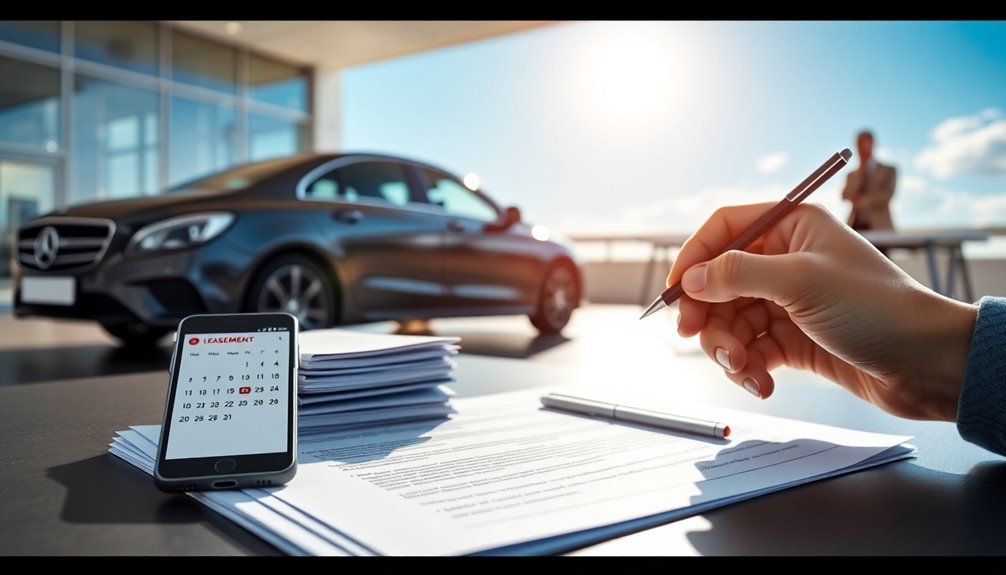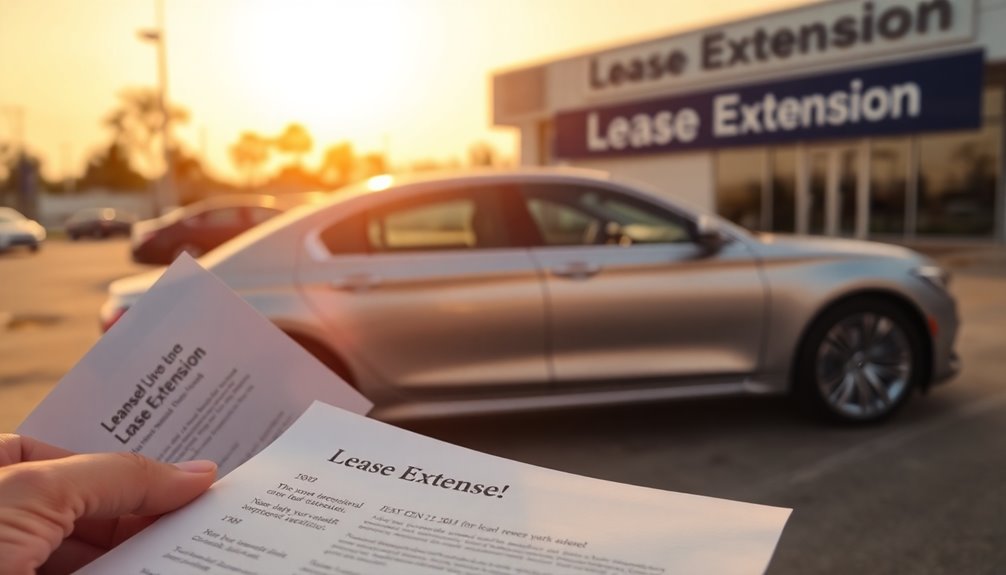To extend your car lease, start by contacting your leasing company to express your interest. You'll need to provide details like your current mileage and lease end date. Decide if you want an informal extension, which may just require a quick phone call, or a formal one that involves a new contract with updated terms. Make sure you're up to date on payments, as the company will review your eligibility. Once approved, carefully review and sign the new agreement. This process can help you avoid penalties and give you more time to evaluate your vehicle options. There's more to know about lease extensions.
Key Takeaways
- Contact your leasing company to express your interest in extending your lease and gather necessary information like current mileage and lease end date.
- Determine if you want an informal extension (short-term) or a formal extension (new lease contract) based on your needs.
- Ensure your payment history is up to date, as leasing companies review eligibility based on timely payments and vehicle condition.
- Complete any required applications and provide documentation if asked; expect the approval process to take about 3-4 weeks.
- Review and understand the new lease terms carefully before signing and returning the contract to the leasing company.
Understanding Car Lease Extensions
Understanding car lease extensions can bring you peace of mind when you need a little extra time with your vehicle.
There are two main types of lease extensions: informal and formal. An informal extension typically lasts up to six months and can often be arranged with just a quick phone call to your leasing company. On the other hand, a formal extension may require you to submit a detailed request for review, as it often includes signing a new lease agreement and can extend your lease for six to twelve months.
Eligibility for lease extensions usually hinges on your payment history. If you've kept up with your monthly payments, you're more likely to qualify. However, any past due payments could jeopardize your request.
When considering a formal extension, be aware of the costs, which can range from approximately £100 for six months to £150 for twelve months. Informal extension costs can vary based on your provider.
If you find yourself needing extra time, knowing these details can help you navigate the process smoothly and guarantee you maintain your vehicle a little longer without any hassle.
Types of Lease Extensions

There are two main types of lease extensions: informal and formal. An informal extension is a short-term arrangement, usually lasting up to six months. You can easily initiate this by calling your leasing company, allowing you to continue using your vehicle under the same payment terms as your original lease.
This option is great if you need a little extra time without committing to a new contract.
On the other hand, a formal extension requires you to sign a new lease contract. This type typically extends your lease for six to twelve months and may come with revised payments and updated mileage limits tailored to your situation.
Eligibility for lease extensions varies by leasing company and often depends on your payment history and the vehicle condition. Unlike informal extensions, formal extensions create a legal obligation, meaning you'll need to adhere strictly to the new terms and conditions.
Understanding these two types of lease extensions will help you decide which option best suits your needs when considering extending your car lease.
Reasons for Lease Extension

Flexibility often plays an essential role in deciding whether to extend your car lease. In today's market, ongoing supply chain disruptions have limited new vehicle inventory, leading to higher prices. If your current vehicle meets your needs, extending your lease can save you from rushing into a new lease or purchase amid economic uncertainties.
Consider your financial situation and any unexpected changes in your life—like a job shift or family needs—that might require more time to secure a suitable replacement vehicle. With rising interest rates, the decision-making process for a new vehicle can take longer, making a lease extension a practical choice.
Here's a quick look at some reasons you might want to extend your lease:
| Reasons to Extend Your Lease | Emotional Impact |
|---|---|
| Avoiding penalties for excess mileage | Peace of mind |
| Flexibility to evaluate options | Reduced stress |
| Familiarity with the current vehicle | Comfort and confidence |
| Financial stability during changes | Security in uncertain times |
| Time to adjust to new economic conditions | Readiness for the future |
How to Request an Extension

If you're considering extending your car lease, the first step is to contact your leasing company directly. Express your desire to extend your car lease and ask about their specific process and requirements. Have your current lease details handy, including the remaining mileage and end date, as this will facilitate the discussion.
Your leasing company may require you to complete an application or provide additional documentation to assess your eligibility for an extension. Be prepared to discuss your situation and any changes that may affect the terms of your lease.
If your request is approved, you'll likely receive a new lease agreement, which may include updated terms regarding monthly payments, mileage limits, and the new end date.
Keep in mind that the entire approval process for a lease extension can take around 3-4 weeks, so it's wise to initiate your request well before your lease is set to end. This guarantees you have ample time to sort out any details and avoid any gaps in your leasing arrangement.
Steps for Formal Extension

To formally extend your car lease, start by contacting your leasing company to express your interest.
They'll review your eligibility based on factors like your payment history and the lease's timeline.
Once approved, you'll need to sign a new contract that outlines the updated terms.
Contact Leasing Company
Reaching out to your leasing company is the first step in extending your car lease. You'll want to contact your leasing company directly to express your interest in a formal lease extension. Be clear about your request for eligibility, as they'll need to evaluate your current lease status and payment history.
When you contact them, make sure to provide any required information, such as your current mileage and how long you want the extension to last. This will help facilitate the approval process.
The leasing company typically takes about 3-4 weeks to review your request, so it's wise to start this process well before your lease end date to avoid any gaps in vehicle usage.
Once your request is approved, you'll receive a new lease contract that includes revised terms. These could involve an updated end date, new mileage limits, and any adjustments to your monthly payments.
Keeping open communication with your leasing company throughout this process will guarantee a smoother experience as you navigate the formal lease extension.
Review Eligibility Requirements
Before you immerse yourself in the lease extension process, it's vital to review the eligibility requirements. To qualify for a formal lease extension, you need to be current on your payments. This means you shouldn't have entered into arrears or experienced any insolvency issues.
If your lease is within the last 90 days of the leasing contract, you may not be eligible for an extension, so early planning is essential.
When you submit your request for an extension, the leasing company will assess your payment history and the condition of the vehicle. Make sure to complete all sections of the lease extension application accurately; any mistakes could lead to denial of your request.
Once your request for a formal lease extension is approved, you'll receive a new leasing contract that outlines the revised terms. These terms typically include a new end date, updated mileage limits, and any adjusted rental fees.
Understanding these eligibility requirements is key to ensuring a smooth shift into your extended lease period.
Sign New Contract
Signing the new contract is a crucial step in securing your car lease extension. Once your leasing company approves your request, they'll provide a formal agreement. This new lease will outline updated terms like the new end date, mileage limits, and any changes in monthly payments.
Before you sign a contract, make certain to review your request carefully. It's important to understand if the lease extension might come with additional fees, typically around $100 for a 6-month extension or $150 for a 12-month one.
Here's a quick overview of what to expect:
| Aspect | Details | Notes |
|---|---|---|
| New Lease Duration | 6 to 12 months | Depends on leasing company policies |
| Additional Fees | $100 for 6 months, $150 for 12 | Confirm with leasing company |
| Updated Terms | Mileage limits, payment changes | Review thoroughly before signing |
| Final Steps | Sign and return to leasing company | Verify all terms are acceptable |
Once you've reviewed everything and are satisfied, sign the contract and return it to finalize the lease extension.
Benefits of Extending Your Lease

Extending your car lease offers several advantages that can ease financial stress and provide greater flexibility. By choosing to extend the lease, you delay your financial commitment, allowing you to navigate the current high new car prices, which averaged $48,510 as of April 2023. This extension helps you maintain uninterrupted access to a reliable vehicle without the immediate financial burden of purchasing a new car.
Additionally, lease extensions give you more time to assess your transportation needs, especially in a market where new car inventory is historically low. You avoid penalties associated with excess mileage or wear and tear that often come with returning a leased vehicle. The process to extend your lease is typically straightforward, often just a phone call to your leasing company, making it a quick solution for your vehicle needs.
Moreover, extending your lease can protect you from the pitfalls of rapid depreciation, particularly when market trends fluctuate. This way, you can make informed decisions about your next vehicle without the pressure of an imminent lease end.
Drawbacks of Lease Extensions

While extending your car lease can provide immediate benefits, it's important to evaluate the potential drawbacks as well. One significant concern is the lease extension fees, which can add to your overall costs. Typically, these fees range from £100 for six months to £150 for a full year, impacting your budget.
Additionally, as your vehicle ages, it may fall out of warranty, leading to unexpected repair costs. Older cars often require more frequent repairs, resulting in higher maintenance expenses. This can become financially burdensome over time.
You should also consider how extending your lease could affect the total costs compared to purchasing a vehicle. If the car's residual value decreases and falls below its market value, you may end up paying more in the long run.
Moreover, you might face penalties or fees for excessive wear and tear, which become more likely as you keep the car longer. These factors combined can make extending your lease less appealing, so weigh your options carefully before making a decision.
Lease Buyout Options

When considering a lease buyout, start by evaluating your vehicle's condition to guarantee it's in good shape before making a purchase.
Next, explore financing options to find the best loan terms and interest rates that suit your budget.
Understanding both aspects will help you make an informed decision about buying out your lease.
Assessing Vehicle Condition
Evaluating the condition of your vehicle is vital before considering a lease buyout. Start by conducting a thorough inspection to identify any damage beyond normal wear and tear. This can affect the final buyout price and may lead to additional fees.
Check your leased car's odometer reading to guarantee it's within the agreed mileage limits; exceeding these can result in costly penalties that might sway your decision.
Next, familiarize yourself with the residual value specified in your lease agreement. This figure represents the estimated worth of the car at lease end and is important for calculating your buyout price.
Assess the overall condition of the vehicle, including tires, brakes, and any mechanical issues. Significant repairs might be necessary, which could influence whether you choose to buy it.
Financing the Buyout
After evaluating your vehicle's condition, the next step is figuring out how to finance the buyout. You've got a couple of options: pay cash upfront or secure a lease buyout loan from financial institutions.
Here's what you need to take into account:
- Assess the Vehicle: Compare your vehicle's current market value with the predetermined residual value in your lease agreement. This helps determine if a buyout makes financial sense.
- Shop for Loans: Lease buyout loans often have higher APRs than new car loans. Be sure to compare different lenders to find the best financing terms for your situation.
- Evaluate Loan Terms: Shorter loan terms may lead to higher monthly payments but result in lower total interest costs. On the other hand, longer terms can ease your monthly burden but increase total interest paid.
- Pre-Approval Options: Some financial institutions offer pre-approval for lease buyout loans. This gives you a clearer understanding of your financing terms before you commit.
Financing a Lease Buyout

Financing a lease buyout can feel overwhelming, but breaking it down into manageable steps makes the process easier. First, you'll need to decide whether to make a cash payment or seek specialized lease buyout loans from financial institutions.
When considering financing, remember that lease buyout loans often have higher annual percentage rates (APRs) than new car loans, reflecting the risk of financing a used vehicle.
Next, evaluate the vehicle's condition and any remaining warranty, as these factors can impact your loan terms and overall cost. Shorter loan terms may result in higher monthly payments, but they usually mean lower total interest costs. Conversely, longer terms can mean lower payments but will accumulate more interest over time.
Don't forget to shop around for the best loan terms. Comparing different lenders can help you understand the total cost of financing, including any potential fees. Additionally, keep in mind that understanding your residual value can help you determine if a lease buyout is financially beneficial.
This step is essential for ensuring that your lease buyout remains affordable. By carefully considering these factors, you can make informed decisions that suit your financial situation.
Finalizing the Extension Process

Once you've received approval for your lease extension, it's time to finalize the process by reviewing and signing the new lease contract. This contract outlines vital updates, such as the new end date, revised payment amounts, and any mileage limits that apply.
Here's what to keep in mind:
- Review the Terms: Make certain you understand the new lease contract, including any changes to payments and mileage limits. Exceeding these limits could lead to extra charges.
- Pay the Formal Extension Fee: Be prepared to pay a formal extension fee, which usually ranges from $100 to $150, depending on the duration of your extension.
- Sign the Extension Agreement: After reviewing, make sure to sign the extension agreement. Keep a copy for your records; it's your proof of the new terms.
- Confirm Updated Status: Contact your leasing provider to confirm that all documentation is processed and your account reflects the updated lease status to avoid any penalties.
Frequently Asked Questions
How Do I Extend the Term of a Lease?
To extend the term of your lease, start by contacting your leasing company.
Let them know you'd like an extension and check if you're eligible based on their policies.
They'll typically assess your request in about 3-4 weeks, considering your payment history.
If approved, you'll receive a new agreement with updated terms.
How Long Does It Cost to Extend a Lease?
You might think extending a lease is a simple, free pass, but it's not quite that easy.
Typically, extending your lease can cost anywhere from £100 for six months to £150 for a year, depending on your leasing company.
And don't forget, informal extensions can sometimes be free! Always check with your provider, as additional costs may pop up for mileage overages or maintenance issues during the extension.
How Do I Extend My Lease Miles?
To extend your lease miles, you'll need to contact your leasing company well before your lease ends.
They often allow mileage adjustments based on individual needs. Be ready to discuss any additional fees, as these can vary.
Review your current lease agreement to know your original mileage limits and penalties.
If you expect to need more miles, ask about formal extensions that include increased mileage limits.
What if My Car Is Worth More Than the Residual Value?
If your car's worth more than the residual value, you've got a golden opportunity.
For example, imagine you leased a vehicle for $25,000, and it's now valued at $30,000. You can buy it for the residual value, potentially saving $5,000.
Use a car value calculator to confirm this, then negotiate with the dealer. They might be willing to adjust the price, especially if they see you're informed about its market value.
Conclusion
Extending your car lease can be a smart move, especially since nearly 30% of leaseholders opt for an extension to avoid the hassle of shopping for a new vehicle. By understanding your options, making a clear request, and weighing the pros and cons, you can navigate the process with ease. Remember, whether it's a simple extension or considering a buyout, being informed is key to making the best decision for your situation. Happy driving!










